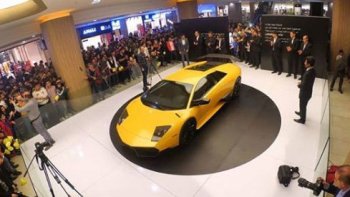Lamborghini Murcielago SV reverse-engineered by a team from Iran

Iranian engineers successfully made themselves a copycat Lamborghini Murcielago SV. In looks, if not in performance, that is. The most interesting aspect behind the project is that they say it was created using Lamborghini's original data. They took a serious left turn when it came to the powertrain though, because sitting behind the driver is a 3.8-liter Hyundai V6. Not quite the 6.5-liter V12 monster in the actual Murcielago SV.
Massoud Moradi, the director of the project, thinks that nobody would be able to tell the difference between this car and Lamborghini's from an appearance standpoint. "All parts of the body, inside the car and precise mechanics of the car are manufactured and mounted based on the original ... Murcielago platform. Its chassis is also one and one with the original," Massoud says. One of the reasons Massoud and his team embarked on this project was to learn how Lamborghini made its supercars. They made their replica after taking apart a real Murcielago and designing new parts based on the original Lamborghini bits.
The project to make this thing started four years ago, and the team didn't spend "any time planning or testing the car." Now that's a clear indication you probably don't want to drive this thing. Just because it's designed to be a copy of the Murcielago doesn't mean it's going to perform anything like it on the road.
We'll admit the exterior design is pretty spot-on compared to the actual Murcielago SV, as you can see in the video above (which comes from RT, a network funded by the Russian government). Everything apparently lines up to the original dimensionally, and it uses a bunch of carbon fiber and composite components throughout. Moradi claims a top speed of at least 174 miles per hour — there's no word on what, if any, modifications have been done to the Hyundai engine and transmission to achieve such a speed. So count us skeptical for the time being.
The Iranian team wants to make more of them too. Moradi suggested that the small company could make 50-100 units per year if they were to go into production. He'd like future iterations of the car to have larger V8 and even V10 engines, too. Might we suggest some testing first? And what does Lamborghini think of this whole operation? These guys purposefully copied one of Lamborghini's designs with an intent to eventually make money off of it. There are plenty of questions to be answered here, but hey, now there's an Iranian super(ish)car. Sort of.
Related News


